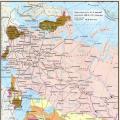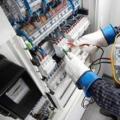Electrical power and electrical engineering - what kind of work can you do in the future? Electrical power and electrical engineering: who to work with and what to prefer Energy and electrical engineering who to work with.
The most common entrance exams:
- Russian language
- Mathematics (profile) - specialized subject, at the choice of the university
- Physics - optional at university
- Computer science and information and communication technologies (ICT) - at the university's choice
- Chemistry - at the university's choice
- Foreign language - at the choice of the university
Electrical power engineering and electrical engineering together constitute a field of science and technology. It occupies a huge place in the world, since it is difficult to imagine the modern world without electrical energy.
It follows that the specialty 03/13/02 “Electrical power engineering and electrical engineering” is almost the most in demand in the labor market. Graduates of this profile can count on a wide choice of enterprises for further work.
This specialty has a wide range of profiles, such as power plants, electromechanics, power supply, electrical equipment, hydroelectric power stations and some others.
Admission conditions
Having graduated from the specialty “Electrical power and electrical engineering,” a young specialist must have universal skills and practical competencies in this field of science and technology, as well as be able to create and operate electrical devices and work with electrical energy flows.
What subjects does an applicant need to take to enter this specialty? The core here is mathematics. Additionally, the applicant must take:
- Russian language;
- physics, computer science and ICT or chemistry (at the applicant’s choice);
- at the discretion of the university - a foreign language.
Future profession
Electrical power and electrical engineering is a basic industry because it produces electrical energy. Here we can say that future graduates will be able to find themselves in various enterprises, organizations and industrial companies. A ready-made specialist will have the following skills and abilities:
- on receipt and distribution of electrical energy;
- for controlling the flow of electricity;
- on the creation and operation of electrical wiring systems;
- on working with electrical machines and converters.
Where to apply
Today, qualified training is carried out in the following priority universities in Moscow and Russia:

Training period
Specialty 03/13/02 “Electrical power engineering and electrical engineering” involves full-time, part-time and evening training. The duration of full-time bachelor's degree is 4 years, and part-time and evening - 5 years.
Main disciplines included in the course of study
The training program includes the following set of core subjects:
- electric power stations;
- electricity supply;
- electrical and electronic apparatus;
- automated design of electrical devices;
- theoretical foundations of electrical engineering;
- relay protection and automation of electrical power systems;
- general energy;
- power electronics.
Acquired skills and abilities
 During the learning process, the student acquires the necessary professional skills and abilities:
During the learning process, the student acquires the necessary professional skills and abilities:
- on working with electrical energy and flow control;
- on the creation and design of electrical machines and equipment;
- on the operation of means for constructing electrical systems;
- on the creation of electrical products;
- on development of electric power industry and electrical engineering;
- on the creation and design of electrical power and electrical systems;
- on formulating tasks in this area.
Job prospects by profession
A graduate of this specialty can apply for work in various fields of activity. These can be a variety of production and technological organizations that are engaged in the production, transmission and distribution of electricity.
Mostly graduates occupy positions as software engineers, electrical systems developers, electric drive engineers and others. Specialists in the fields of electric power, industry, mechanical engineering, and transport are in demand.
In Russia, there are quite large and promising organizations that always need specialists in electrical power engineering and electrical engineering. Here we can immediately talk about Gazprom LLC, Lenenergo OJSC or Roselektroprom Holding CJSC. These and other large enterprises have many partners, which suggests the need for specialists to work at these enterprises.
Earnings will range from 20-35 thousand hryvnia depending on the enterprise and position.
Advantages of Master's Degree Studies
Every bachelor's degree graduate has the opportunity to enroll in a master's program (“Electrical power and electrical engineering” - 04/13/02). Continuing education always involves an in-depth program that allows you to expand your range of perspectives.
In the master's program, the student undergoes training in the management of electrical power systems, as well as their maintenance and improvement. Here he will study the design and research of electric drives.
Masters in this specialty are in demand abroad, not to mention Russia. They may be needed both as teachers and researchers. Enterprises will primarily hire highly qualified specialists who have completed a master's degree.
Description
This profile trains a new generation of power engineers who will be able to design and operate any electric power and thermal power plants, regardless of what energy resource they use: natural energy flows or unconventional electricity and heat generation schemes. Training in a specialty involves studying a large number of specialized subjects and several general disciplines, as well as research work. Among the required subjects: thermal engineering, electrical engineering materials science, fundamentals of energy, structural materials science, energy machines, theoretical foundations of mechanics, hydroaeromechanics, renewable energy sources, life safety.
Who to work with
Depending on the profile chosen by bachelors, they can find employment in energy-saving companies, at power plants of any type, in technology parks, at industrial enterprises (as energy specialists) or in scientific organizations. The competence of young specialists includes control over the transmission and distribution of energy, its use, production and transformation. After graduating from a university, a bachelor’s degree in energy and electricity often works as an electrical system maintenance specialist, energy safety specialist, or engineer. In the future, he can climb the career ladder and take the position of project manager or technical director. Those who are interested in research work can find employment in scientific laboratories and institutes and engage in innovative research in the field of electricity, the creation of autonomous energy sources and power plants powered by energy from natural flows (for example, from wind or sun).
About the direction:Electric power industry is one of the leading branches of energy, which includes the sale, transmission and production of electricity. This branch of energy is considered important because it has great advantages relative to other types of energy, namely: distribution between consumers, it is easy to transport over long distances and convert into other energy (thermal, mechanical, light, chemical, etc.). A distinctive feature of electrical energy is its simultaneity in energy generation and consumption, since electric current travels through networks almost at the speed of light.
At this time, there are several types:
Thermal power engineering.
The principle is this: the combustion energy (thermal) of organic fuels is converted into electrical energy. The thermal power industry includes thermal power plants - condensing and district heating.
Nuclear energy.
It includes nuclear power plants. The principle of generating electricity is similar to energy generation at thermal power plants. The difference is that thermal energy is obtained by fission of atomic nuclei in a reactor, and not by burning fuel.
Hydropower.
This type of energy generation includes hydroelectric power plants. Here, the energy of water flow (kinetic) is converted into electricity. With the help of dams, an artificial difference in surface levels on rivers is created. Under the influence of gravity, water from the upper pool flows through special channels into the lower compartment. There are water turbines in the ducts, their blades are spun by the water flow.
The direction “Electrical power engineering and electrical engineering” represents a part of science and technology, which includes a set of means, methods and methods of activity created for the use of electrical energy, control of its flows, direct and reverse conversion of other types of energy into electrical energy.
The objects of professional activity of a bachelor are:
- electrical machines, electromechanical complexes and systems, including their control and regulation;
- complexes and systems of electromechanical and electronic devices;
- automatic devices and systems for controlling energy flows;
- electrotechnological, electric welding and electrophysical installations and processes;
- various types of electric transport and means of ensuring the optimal functioning of transport systems;
- elements and systems of electrical equipment of cars and tractors;
- electrical power systems;
- electrical facilities of industrial enterprises;
- all factory low-voltage and high-voltage electrical equipment, electrical installations, networks.
Graduates with a degree in Electrical Power Engineering and Electrical Engineering are always in demand specialists in the labor market. Upon completion of training, graduates of this profile successfully find application of their knowledge in energy companies, industrial, motor transport, agricultural enterprises, design and research organizations. They can work in the following positions: energy engineer, chief energy engineer, process engineer, site manager, industrial power engineer, city power grid engineer.
13.03.02
Electrical power and electrical engineering
GENERAL CHARACTERISTICS OF THE PROFESSION
In modern economic conditions, the energy complex is the most stable industry. Almost today there is no branch of human activity where electrical energy is not used. A large number of electrical power and electrical systems are life support systems for settlements, enterprises, all types of production, transport, etc. Problems of energy saving, both in large enterprises and in small and medium-sized businesses, with rising tariffs, become of utmost importance. In this regard, the need for energy specialists is increasing every year.
Any enterprise, organization, firm, even the smallest one, must resolve issues of its heat and electricity supply and have a specialist on staff who is capable of doing this. Such specialists are graduates of the direction “Electric power and electrical engineering". They are always in demand and are provided with high-paying jobs.
An electrical engineer is a specialist with a higher technical education in power supply systems, electrical installations, networks and systems. An electrical engineer works at energy and electrification enterprises, industrial, transport, agricultural enterprises, in design, engineering and scientific organizations.
WHAT WILL THEY TEACH?
Design, construction of the electrical part of industrial plants and equipment, power supply systems for cities, enterprises, etc., design of electrical machines and devices;
Development of technological processes for power supply,
Construction and operation of power and electrical equipment;
Installation, adjustment, testing and maintenance of electrical equipment;
Methods for monitoring the condition of the electrical parts of installations and equipment, power supply systems.
IMPORTANT ITEMS
Theoretical foundations of electrical engineering, electrical engineering and structural materials science, general energy, power substations, power systems and networks, relay protection and automation of power systems, high voltage technology, operation of power supply systems.
WHOM TO WORK?
Energy companies,
Workers of power plants, thermal power plants, electricians of the housing and communal services complex,
Cable design in houses, new buildings.
Design of new engines, machines, electrical energy metering systems, design of transformers and transformer substations,
Non-traditional energy sources,
Energy management and energy audit.
 Get translation and transcription, pronunciation, phrases and sentences Set expressions, phrases, idioms with the verb Get
Get translation and transcription, pronunciation, phrases and sentences Set expressions, phrases, idioms with the verb Get Russian Empire in the second half of the 18th century Economic policy of Catherine II
Russian Empire in the second half of the 18th century Economic policy of Catherine II Electrical power and electrical engineering: who to work with and what to prefer Energy and electrical engineering who to work with
Electrical power and electrical engineering: who to work with and what to prefer Energy and electrical engineering who to work with